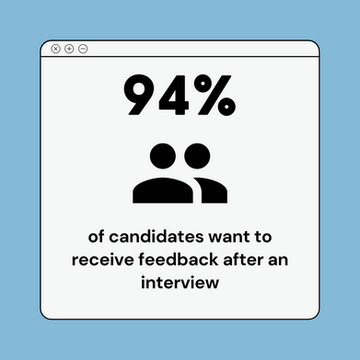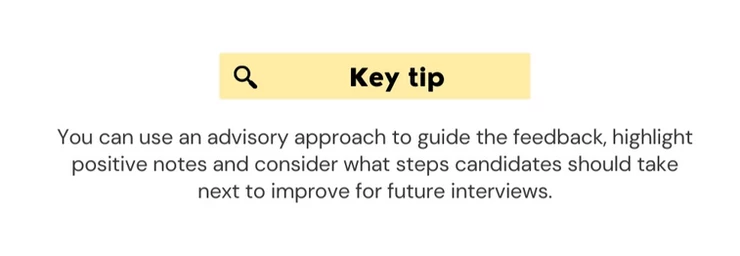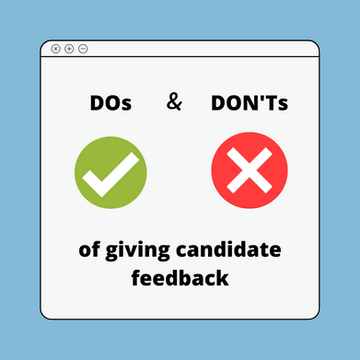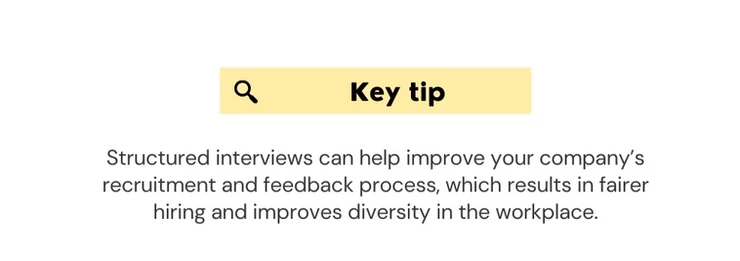When it comes to recruitment, we all know how much time and effort goes into setting up, scheduling and running interviews. We also know it can be difficult to find the time to give candidates valuable feedback after several rounds of interviews, especially if you have high volume interview campaigns. However, with the right tools and technology, you can automate each stage of your hiring process, helping you save time and resources in the long run.

The Importance of Candidate Feedback
Giving interview feedback to candidates can be challenging, especially when hiring at scale or with no structure in place. However, this is something many candidates desire after their interview, as it helps to improve the candidate experience. Providing feedback helps to inform candidates on how they performed and for those who were unsuccessful, this gives them clarity where they can make improvements for future interviews.
Giving honest and actionable feedback can have a massive boost on your employer brand and can help you build a talented pool of advocates and potential future employees.
Feedback Best Practices
1. Give constructive feedback

Studies have shown that 53.5% of job candidates receive no feedback after the screening and interviewing stage, while 69.7% of candidates receive no feedback after being rejected during the screening and interviewing stages. Although subjective, 77.3% of those that did receive feedback claimed it wasn’t useful.
According to LinkedIn’s Global Talent Trends report, 94% of candidates want to receive feedback after an interview, and are 4x more likely to consider your company for future opportunities if you offer them constructive feedback.
Providing candidates with constructive feedback is best when you keep it professional with clear actionable points. Try to word the feedback constructively and provide evidence from the interview if possible. This will allow candidates to not only improve but inspire them to take action.

2. Provide phone and written feedback
Phone calls offer a tailored approach to candidates, especially if they have been through several rounds in the assessment stage. Although it can be tough for candidates to hear they were not successful over the phone, this approach reflects professionalism and appreciation of their time. This not only gives candidates the opportunity to ask questions, but provides you with the opportunity to gain feedback from candidates on their experience and what improvements you can make to your hiring process.
You can also use the written feedback approach, the advantage with this is that it allows candidates to refer back to it for future applications.
Giving interview feedback – The Dos and Don’ts

The Dos
1. Use a standardised interview process. This will make the feedback process more efficient and accurate, so candidates will benefit from valuable feedback.
2. Candidate scorecards ensure interviewers deliver feedback in the same format and according to the set criteria. Having this in a centralised system provides consistent feedback and makes it easier to deliver it to candidates.
The Don’ts
1. Don’t compare and contrast candidates in your feedback, but rather tell them what more they could have done to get the role. Focus on their interview performance and what they can do to improve, rather than comparing them to the successful candidate. This will encourage the unsuccessful candidates to enhance their strengths for future job opportunities.
2. Try to avoid sending generic feedback to candidates, instead make sure to give specific details that they can work on, use examples from their interview (detailed notes are useful or audio transcription if you use interview software) so they actually know what you are referring to.
How to improve your feedback process
1. Improved interview process: structured interviews with detailed note taking is a must. It forms the basis of hiring decisions and candidate feedback, which needs to be accurate. Equitas software automates this process with audio recording and transcription, making it easier to highlight evidence to support feedback.
2. Allocate enough time for feedback: this should not be a rushed process, you should allow enough time to reflect on the notes from the interview and be selective in what you include in the feedback. Auto-generated feedback is useful in this area as it will speed up the process, but it’s still key to personalise feedback for each candidate.

Overall, candidate feedback is an important part of your hiring process and a streamlined process will make it a more seamless experience for your hiring team. Taking the steps mentioned above will help build a pipeline of engaged brand advocates and potential hires for the future. Even if the candidates are not right for the role, they will be more willing to refer other people within their network if you leave them with a lasting positive impression.
For more information on candidate feedback, click here, or if you want to know more about our interview software get in touch to book a demo.


